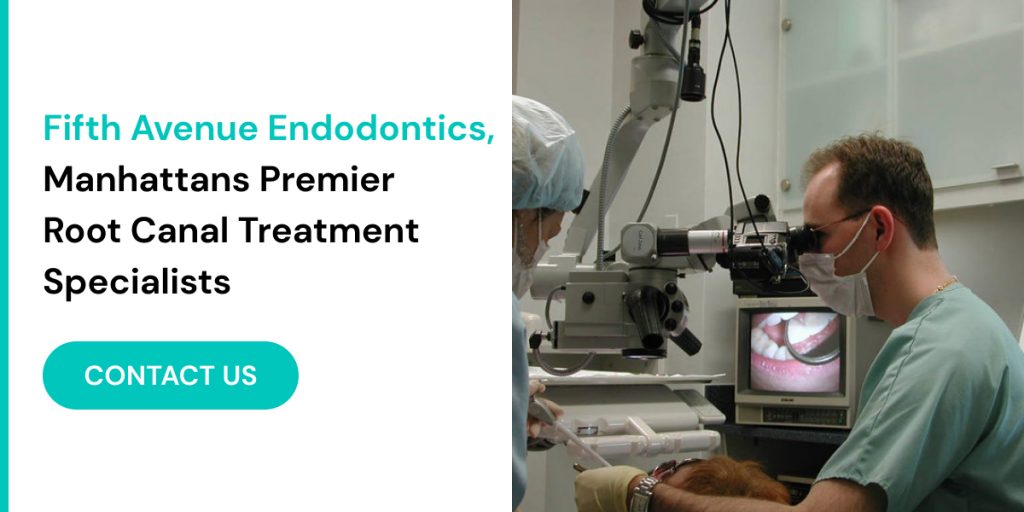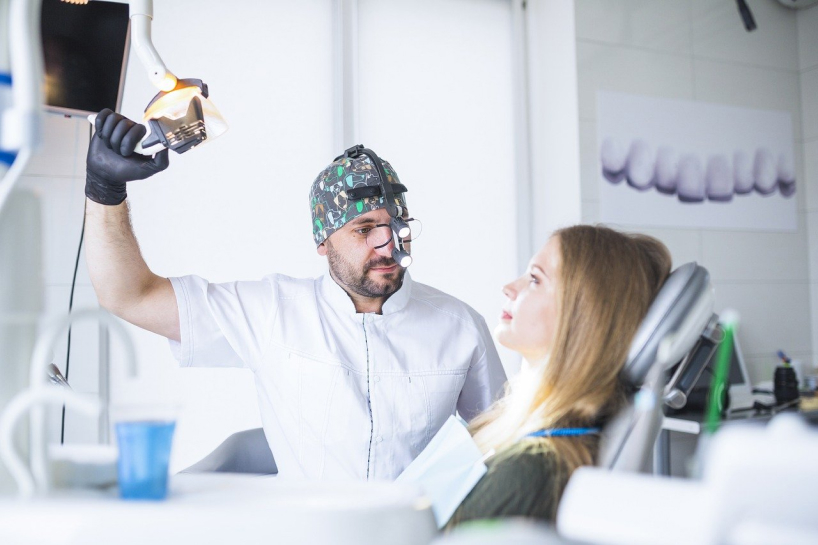Toothaches are no fun for anyone, but for individuals with Autism Spectrum Disorder (ASD), a seemingly simple dental issue can become a source of significant anxiety and discomfort. The unfamiliar environment, bright lights, and dental instruments of a traditional dental office can be overwhelming for people with sensory processing sensitivities. Additionally, communication challenges often experienced by those with ASD can make it difficult to express their pain or fear to the dentist. This combination of factors can lead to increased stress and potentially hinder the root canal procedure itself.
Fortunately, there is hope. Here at Fifth Avenue Endodontics, Dr. Iofin, a leading Manhattan-based endodontist with extensive experience treating patients with ASD, understands these unique challenges. Dr. Iofin offers a tailored approach to root canal treatment in New York City, NY that prioritizes patient comfort and reduces anxiety. This approach ensures a positive dental experience for all patients, especially those on the autism spectrum.
Understanding Root Canal Treatment: A Closer Look
Before we delve into the specifics of root canal treatment for patients with Autism Spectrum Disorder (ASD), let’s revisit what a root canal actually is and why it might become necessary. The inner chamber of your tooth, known as the pulp, is more than just an empty space. It’s a vital component containing nerves, blood vessels, and connective tissues that help nourish the tooth and contribute to sensation.
However, the pulp can become compromised due to various reasons. Deep decay, a chipped or cracked tooth, repeated dental procedures on the same tooth, or even trauma to the face can all lead to inflammation or infection of the pulp. When this happens, you may experience symptoms like throbbing tooth pain, sensitivity to hot and cold temperatures, swelling in the gums, or even facial pain.
If left untreated, an infected pulp can cause significant discomfort and even lead to the loss of the tooth. This is where root canal treatment comes in. It’s a procedure designed to save a tooth by addressing the infected pulp. During a root canal, the dentist will numb the area around the tooth with local anesthesia to ensure your comfort. Then, a small opening is made in the crown of the tooth to access the pulp chamber. The infected pulp, nerves, and blood vessels are carefully removed.
The canals within the root of the tooth are then meticulously cleaned and disinfected to eliminate any remaining bacteria. These canals are tiny passageways that extend from the pulp chamber down the root of the tooth. Once the canals are cleaned and shaped, they are filled with a special material to prevent reinfection. Finally, the dentist will seal the opening in the tooth with a filling or crown to restore its function and aesthetics.
Root canal treatment is a highly effective procedure with a high success rate. It allows dentists to save a natural tooth that would otherwise be lost due to infection. This not only preserves your smile but also maintains the functionality of your teeth, allowing you to chew comfortably and speak clearly.
Navigating the Dental Chair: Challenges of Root Canals for Patients with ASD
For individuals with Autism Spectrum Disorder (ASD), a trip to the dentist can be far more daunting than for the typical patient. While a root canal itself might be a necessary procedure, the road leading there can be filled with obstacles for someone with ASD. Here’s a closer look at the specific challenges patients with ASD face when undergoing root canal treatment:
- Sensory Overload: Dental offices are a symphony of sights, sounds, and smells that can be overwhelming for people with sensory processing difficulties. The bright lights, whirring of equipment, and unfamiliar chemical odors can all contribute to anxiety and discomfort. Simple tasks like keeping their mouth open for extended periods or wearing a dental bib might feel restrictive and lead to agitation.
- Communication Barriers: Effectively communicating needs and anxieties is crucial in any medical setting. However, for individuals with ASD who may have difficulty with verbal communication or expressing themselves clearly, explaining their pain or fear to the dentist can be a significant hurdle. This can lead to frustration and misunderstandings, hindering the dentist’s ability to provide optimal care and ensure the patient’s comfort.
- Routine Disruption: People with ASD often thrive on routine and predictability. The unfamiliar environment and unexpected procedures associated with a root canal can be highly disruptive. This disruption to their established routine can trigger anxiety and make it difficult for them to cooperate during the treatment.
- Fear of the Unknown: The unknown can be a source of significant anxiety for anyone, and this is especially true for individuals with ASD. The lack of familiarity with the root canal procedure itself, the potential for discomfort, and the use of unfamiliar instruments can all contribute to heightened anxiety and apprehension.
These challenges can not only make the root canal experience itself more stressful for patients with ASD, but they can also make it more difficult for the dentist to complete the procedure effectively. However, with a tailored approach and an understanding of these specific needs, a root canal treatment can be a successful and positive experience for patients with ASD.

Dr. Iofin’s Tailored Approach: A Stress-Free Root Canal Experience for Patients with ASD
At Fifth Avenue Endodontics, Dr. Iofin understands that a root canal procedure can be particularly challenging for individuals with Autism Spectrum Disorder (ASD). Recognizing the unique needs of this population, Dr. Iofin has developed a tailored approach to root canal treatment in New York City, NY that prioritizes comfort, minimizes anxiety, and ensures a positive experience for patients with ASD. Let’s delve deeper into the specific elements of this approach:
1. Pre-Appointment Preparation: Paving the Way for Success
Clear communication is the cornerstone of Dr. Iofin’s approach. Even before the appointment, his team works closely with parents or caregivers to understand the patient’s individual needs and preferences. This includes gathering information about the patient’s sensory sensitivities, communication style, and any potential anxieties they might have about the procedure.
Social Stories and Visual Aids: To familiarize the patient with the dental environment and the steps involved in a root canal, Dr. Iofin’s team may create social stories or visual aids. Social stories are a powerful tool often used with individuals on the autism spectrum. These stories provide a step-by-step narrative of what to expect during the appointment, including descriptions of the sights, sounds, smells, and sensations the patient might encounter. Visual aids, such as pictures or videos, can further enhance understanding and reduce the fear of the unknown.
2. Creating a Sensory-Friendly Environment:
The sights, sounds, and smells of a traditional dental office can be overwhelming for people with sensory processing difficulties. Dr. Iofin’s team goes the extra mile to create a calming atmosphere that caters to these sensitivities. This might involve:
- Dimming the lights to create a more relaxing environment.
- Offering noise-canceling headphones to block out the sounds of dental equipment.
- Providing fidget toys to help patients manage any anxiety or restlessness during the procedure.
- Using essential oils or diffusers with calming scents like lavender or chamomile.
3. Individualized Communication: Building Trust and Understanding
Effective communication is crucial throughout the root canal procedure. Dr. Iofin understands that traditional verbal communication might not be the most effective method for all patients with ASD. He employs various alternative communication techniques to ensure the patient feels understood and involved throughout the process. This may include:
- Using pictures or flashcards to represent different steps of the procedure and explain what the patient can expect to feel.
- Emphasizing clear and concise language with minimal medical jargon.
- Providing opportunities for the patient to express their needs and concerns, whether verbally, through hand signals, or with the help of assistive communication devices.
4. Prioritizing Comfort with Pain Management Options
Dr. Iofin recognizes that pain management is a critical aspect of a positive root canal experience for all patients, especially those with ASD. He offers various options to ensure the patient’s comfort throughout the procedure. These may include:
- Local anesthesia to numb the area around the tooth and minimize discomfort.
- Nitrous oxide (laughing gas), which can help patients relax and reduce anxiety.
- Oral sedation for patients who require a deeper level of relaxation during the procedure.
5. Positive Reinforcement: Celebrating Milestones
Positive reinforcement plays a significant role in Dr. Iofin’s approach. He acknowledges the patient’s bravery and celebrates their cooperation throughout the root canal procedure. Verbal praise, stickers, or other small rewards can be highly motivating for patients with ASD and help to create a positive association with dental care.
By implementing these tailored strategies, Dr. Iofin’s approach transforms root canal treatment from a potentially stressful experience into a manageable and even positive one for patients with ASD. This holistic approach ensures that all patients, regardless of their neurodevelopmental needs, receive the highest quality endodontic care in a comfortable and supportive environment.
The Importance of Early Diagnosis and Proactive Dental Care for Patients with ASD
While Dr. Iofin’s tailored approach can make root canal treatment a positive experience for patients with ASD, ideally, the need for such procedures can be minimized through early diagnosis and intervention. Here’s why proactive dental care is crucial for maintaining good oral health in this population:
- Unique Challenges with Oral Hygiene: Individuals with ASD may face challenges with daily oral hygiene routines like brushing and flossing. Sensory sensitivities to toothpaste flavors or the texture of a toothbrush can make these tasks difficult or even unpleasant. Additionally, communication barriers can make it hard for caregivers to effectively guide and monitor oral hygiene practices.
- Increased Risk of Dental Problems: Due to these challenges with oral hygiene, individuals with ASD are at a higher risk of developing dental problems like cavities and gum disease. These issues, if left untreated, can progress and eventually necessitate more complex procedures like root canals.
- Early Intervention for Better Outcomes: Early diagnosis of ASD allows dentists to implement preventative measures and address any potential oral health concerns from a young age. This can include teaching modified oral hygiene routines, providing alternative tools or techniques, and addressing any sensory sensitivities that might hinder proper care.
- Building Trust and Familiarity: Regular dental checkups, even when no immediate issues are present, are crucial for building trust and familiarity with the dentist and the dental environment. This positive association with dental care can make future procedures, including potentially necessary root canals, less stressful for the patient.
- Maintaining Overall Health: Oral health is intricately linked to overall health. By maintaining good oral hygiene and addressing dental problems early on, patients with ASD can reduce their risk of developing other health complications.
Partnering with Parents and Caregivers
Effective dental care for patients with ASD requires a collaborative effort. Dr. Iofin works closely with parents and caregivers to develop an individualized plan that addresses the patient’s specific needs and preferences. This collaboration can involve:
- Training on modified oral hygiene techniques that cater to sensory sensitivities.
- Developing communication strategies to ensure the patient feels comfortable and understood during appointments.
- Addressing any anxieties the patient or caregivers might have about dental procedures.
By prioritizing early diagnosis, proactive dental care, and a collaborative approach with families, Dr. Iofin strives to ensure optimal oral health for all his patients, including those on the autism spectrum. This proactive approach not only reduces the need for complex procedures like root canals but also contributes to the overall well-being of patients with ASD.

Conclusion: A Positive Dental Experience for All
Having a root canal doesn’t have to be a source of anxiety for patients with Autism Spectrum Disorder. By understanding the unique challenges faced by this population and employing a tailored approach, Dr. Iofin at Fifth Avenue Endodontics provides root canal treatment in New York City, NY that is both effective and comfortable for patients with ASD. Through a tailored approach that prioritizes comfort, clear communication, and sensory sensitivity, Dr. Iofin transforms root canal treatment into a positive experience.
If you have any questions or concerns about root canal treatment for yourself or a loved one with ASD, contact Fifth Avenue Endodontics today. Dr. Iofin and his team are dedicated to providing exceptional, individualized care for all their patients, ensuring a healthy smile and a stress-free dental experience.

